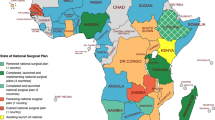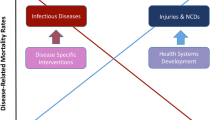Abstract
Addressing global health disparities in the developing world gained prominence during the first decade of the twenty-first century. The HIV/AIDS epidemic triggered much interest in and funding for health improvement and mortality reduction in low- and middle-income nations, particularly in sub-Saharan Africa. Alliances between U.S. academic medical centers and African nations were created through the departments of internal medicine and infectious disease. However, the importance of addressing surgical disease as part of global public health is becoming recognized as part of international health development efforts. We propose a novel model to reduce the global burden of surgical diseases in resource poor settings by incorporating a sustained institutional surgical presence with our residency training experience by placing a senior surgical resident to provide continuity of care and facilitate training of local personnel. We present the experiences of the University of North Carolina (UNC) Department of Surgery as part of the UNC Project in Malawi as an example of this innovative approach.

Similar content being viewed by others
References
Garrett L (2007) The challenge of global health. Foreign Aff 86:14–38
Farmer PE, Kim JY (2008) Surgery and global health: a view from beyond the OR. World J Surg 32:533–536
Ivers LC, Garfein ES, Augustin J et al (2008) Increasing access to surgical services for the poor in rural Haiti. World J Surg 32:537–542
Debas H, Gosselin R, McCord C et al (2006) Surgery. In: Jamison D (ed) Disease control priorities in developing countries, 2nd edn. New York, Oxford University Press, pp 1245–1259
Ozgediz D, Hsia R, Weiser T et al (2009) Population health metrics for surgery: effective coverage of surgical services in low-income and middle-income countries. World J Surg 33:1–5
Daar AS, Singer PA, Persad DL et al (2007) Grand challenges in chronic non-communicable diseases. Nature 450:494–496
World Health Organization (2009) World health report 2006: Working together for health. Geneva. http://www.who.int/whr/2006/en/. Accessed 25 July 2009
Pereira C, Cumbi A, Malalane R et al (2007) Meeting the need for emergency obstetric care in Mozambique: work performance and histories of medical doctors and assistant medical officers trained for surgery. BJOG 114:1530–1533
MacGowan WA (1987) Surgical manpower worldwide. Bull Am Coll Surg 72:5–9
Central Intelligence Agency. Washington DC. http://www.cia.gov/library/publications/the-world-factbook/geos/mi.html. Accessed 20 June 2010
Central Intelligence Agency. Washington DC. http://www.cia.gov/library/publications/the-world-factbook/geos/mi.html. Accessed 15 Dec 2009
Brown D (2005) The need to be there. Carolina Alumni Rev 94(1):18–29
Lavy C, Tindall A, Steinlechner C et al (2007) Surgery in Malawi—a national survey of activity in rural and urban hospitals. Ann R Coll Surg Engl 89:722–724
Jayaraman S, Ayzengart AL, Goetz LH et al (2009) Global health in general surgery residency. J Am Coll Surg 208:426–433
World Health Organization. Geneva. http://www.who.int/healthinfo/global_burden_disease/2004_report_update/en/index.html. Accessed 20 June 2010
World Health Organization. Verbal autopsy standards: ascertaining and attributing cause of death. Geneva. http://www.who.int/whosis/mort/verbalautopsystandards/en/index.html. Accessed 20 June 2010
Ozgediz D, Roayaie K, Wang J (2006) Surgery and global health: the perspective of UCSF residents on training, research and service. Bull Am Coll Surg 91(5):26–35
Acknowledgments
Funding for this work was provided by the North Carolina Jaycee Burn Center at the University of North Carolina; the University of North Carolina Center for AIDS Research Developmental Award (P30 AI50410); and by the National Institutes of Health Office of the Director, Fogarty International Center, Office of AIDS Research, National Cancer Center, National Eye Institute, National Heart, Blood, and Lung Institute, National Institute of Dental & Craniofacial Research, National Institute on Drug Abuse, National Institute of Mental Health, National Institute of Allergy and Infectious Diseases Health, and National Institutes of Health Office of Women’s Health and Research through the International Clinical Research Fellows Program at Vanderbilt University (R24 TW007988). The authors are particularly grateful to Anthony Meyer, MD, PhD, Chairman of the University of North Carolina Department of Surgery for his leadership and support of our work in Malawi.
Author information
Authors and Affiliations
Corresponding author
Rights and permissions
About this article
Cite this article
Qureshi, J.S., Samuel, J., Lee, C. et al. Surgery and Global Public Health: The UNC-Malawi Surgical Initiative as a Model for Sustainable Collaboration. World J Surg 35, 17–21 (2011). https://doi.org/10.1007/s00268-010-0836-2
Published:
Issue Date:
DOI: https://doi.org/10.1007/s00268-010-0836-2




